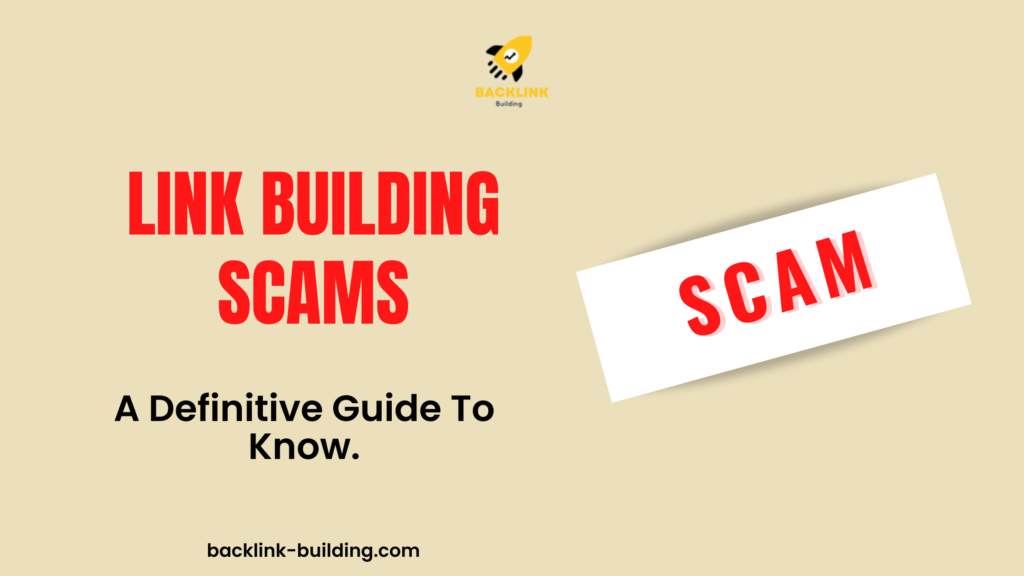
Link building is one of the most important aspects of SEO. Done correctly, it can help your website rank higher in search engine results pages and attract more visitors. However, if you’re not careful, you may end up engaging in link building scams without realizing it.
In this article, we will discuss six link building scams that can hurt your SEO efforts, as well as what to do if you’ve performed any of these methods in the past. We’ll also answer some frequently asked questions about link building scams and discuss tips for avoiding them altogether.
So, let’s get started by understanding.
What is link building?
Simply put, link building is acquiring links from other websites to your site. This can be accomplished through various methods, such as link exchanges, guest posting, etc.
Now that you know what link building is, let’s look at some link building scams that can hurt your SEO efforts.
Six Link Building Scams That Hurt SEO
Well, Goole considers these link building scams as spam links, and so it’s known as link spamming.
Here are Six of the most popular link building scams to watch out for:
PBNs(Private Blogging Networks)
This link-building scam involves creating your network of websites, often purchased from domain registrars or other sources.
While these networks may offer your site powerful link-building opportunities, they can also penalize or block your website if Google discovers that you are using them to manipulate link metrics.
How do we know if the link-building services they provide are PBNs link building or not?
If you are considering working with a link-building service, it’s essential to research and look for clues that they may be using PBNs or other link-building scams.
There are several ways you can tell whether the service provider is using a PBN. Some of them are:
- They claim that their links are “private” or “exclusive” to your website
- They provide link building services that focus primarily on link quantity rather than link quality
- They claim that they can offer “fast link building” or other services that promise quick link-building results
- They emphasize backlinks from blogs or forums rather than websites with high domain authority
- The link-building service offers link packages that seem to be overpriced or too good to be true
- They offer link-building services that focus on link location and placement rather than link relevance or quality
Link Farms
A link farm is another link-building scam that involves creating a network of websites to manipulate link metrics.
Unlike link networks, link farms are often created by a single person or group of people and can thus be more accessible for Google to detect.
If you suspect a link-building service provider may be using link farms, look for signs that their links have been created with automated systems or programs. Some possible indicators include the following:
- Links from sites with unnaturally high link counts, such as hundreds or thousands of links per page
- Links from sites that do not appear to have relevant content or purpose
- Links that use generic anchor text like “click here” instead of more specific keywords related to your industry
Fake Guest Post
Fake guest post link building is a link building scam that involves creating and publishing articles on sites like Medium or WordPress.com rather than high-quality industry publications or blogs with authoritative link profiles.
If you are considering working with a link-building service provider that offers fake guest post link building services, be sure to look for any signs that they may be using this link-building scam. Some red flags to watch out for include the following:
- Links from low-authority websites without much traffic or engagement
- Articles with clearly automated titles that do not match the content of the article itself
- Articles published on sites with no bio section or contact information for the author
Content Spinners
Content spinners are link-building scams that involve using automated tools to take existing content and “rewrite” it in a way that appears original but is plagiarized from other sources.
Because these links are often created by bots or software, they may also be detected by Google as link spam. But, if you use link-building services that offer content spinning, look for any signs that the service provider may be using automated link-building tactics. Some signs to watch out for include the following:
- Low-quality content with frequent spelling or grammatical errors
- Articles that link to the same website multiple times
- Articles that link out to unrelated websites or products
Low-Quality Directories
These scams involve paying a fee to be included in a link directory or submission website. While these link directories may have high link counts, they are often low-quality links that offer little benefit to your website’s link profile or SEO rankings.
They can also link to unrelated or low-quality websites, negatively impacting your website’s link profile and search engine visibility.
Content Syndicators
This link-building scam involves paying a link broker or link building service to submit your content to popular websites to get backlinks.
But, link brokers and content syndication services often link to low-quality or unrelated sites that can hurt your website’s link profile and search engine rankings.
Suppose you suspect a link-building service provider is using any of these link-building scams. In that case, it’s best to avoid working with them or find alternative link-building methods that focus on creating high-quality and editorial links.
What To Do If You Perform Any Method In The Past?
Suppose you have used any of the above-mentioned link-building scams in the past. In that case, it’s essential to be honest about your link-building history and take steps to rectify any adverse effects these link-building methods may have had on your website’s link profile and search engine rankings.
One possible approach is to disavow link-building tactics or services that you suspect may have been illegitimate, such as link farms, content spinners, or low-quality directories.
You can also work to build high-quality links through more legitimate methods like guest posting on reputable industry blogs and websites or creating original content for distribution on social media and other online platforms. Overall, it is essential, to be honest with yourself about your history with link building,
Does Google Consider These Scams?
Yes, Google takes link spam, and link building scams seriously and often penalizes websites participating in these activities. Google has released several link spam prevention algorithms and updates over the years to penalize websites suspected of link-building scams or link spam tactics, such as link exchanges, link farms, link directories, guest posting networks, and link brokers.
If you believe your website has been penalized or negatively affected by link spam or link-building scams, Get it resolved quickly by an SEO service provider.
Conclusion
Now that you know more about link-building scams and their potential adverse effects on your website’s link profile and search engine rankings, you must be aware of these link-building strategies and avoid using them in your link-building campaigns. Instead, focus on building high-quality links through legitimate link-building methods.
If you have questions about link building scams, feel free to comment in the comment section. We will be happy to answer you.
Thanks for reading 🙂


